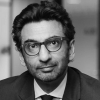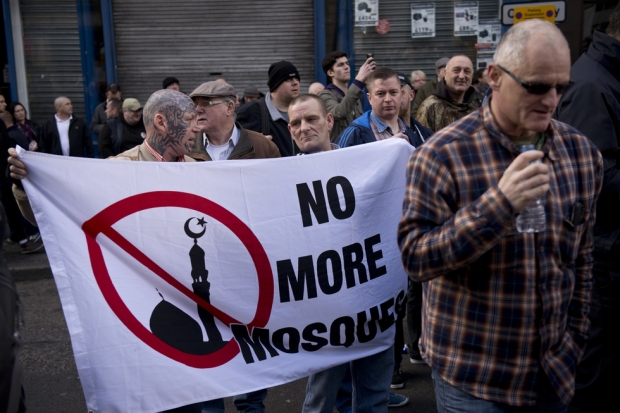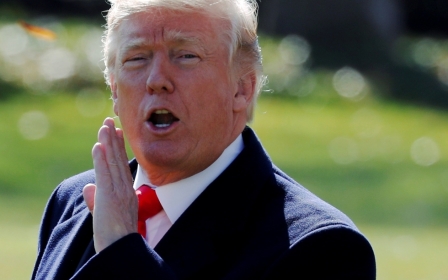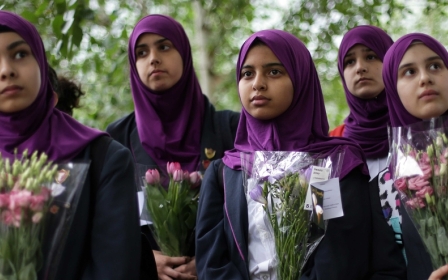Islamophobia and radicalisation in an age of disinformation
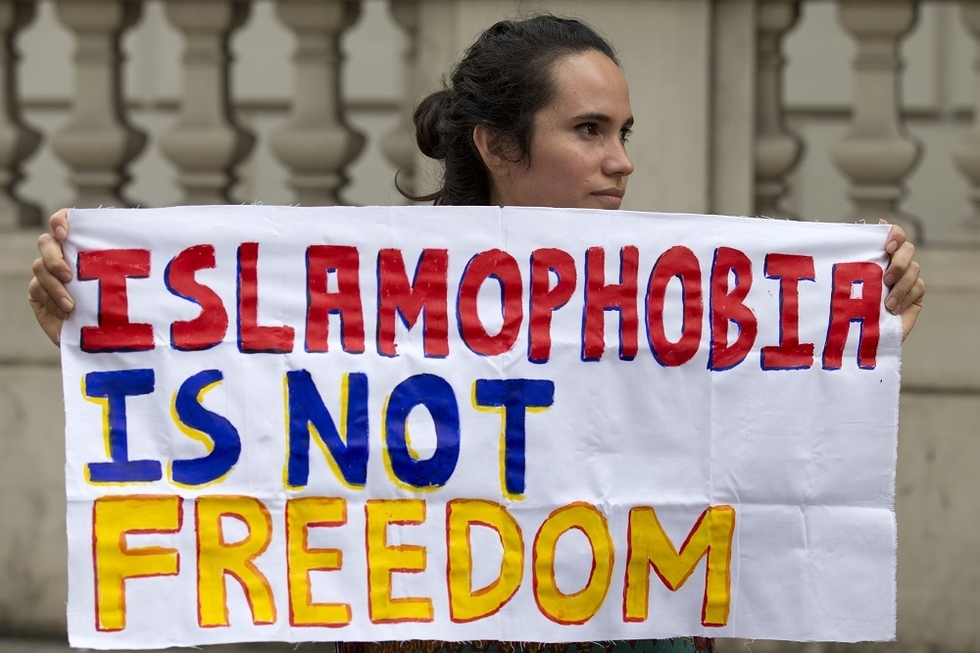
It is coming to the end of 2017. This year there have been five UK terrorist attacks, with 35 dead and many others injured. Nine attacks were thwarted by the security services, including one targeting Downing Street and the prime minister.
At the same time, Islamophobia is more virulent and aggressive than ever, but while more investment goes into counter-terrorism and countering violent extremism projects, these attacks keep happening. Indeed, we are experiencing the hyper-normalisation of Islamophobia and radicalisation yet we are no closer to fixing either. Why is this the case?
With experts derided, and critics of all hues silenced, the average citizen is more confused than ever – and this is entirely deliberate.
We are living in an age of rampant disinformation and there seems to be no escape from it.
Age of fake news
It could be argued that the current wave of anti-Islam "fake news" or disinformation took off during the time of 9/11, although it is clear orientalism and Islamophobia have a much longer history in the West.
The "weapons of mass distraction" led to the illegal invasion of Iraq, when much of the world argued, with millions demonstrating in cities all of the world, that Saddam Hussain was no threat to the West and going into Iraq was a folly that would cost countless lives.
After numerous pressures derailed the Arab Spring in Egypt, the attacks on Libya and Syria led to the destabilisation of the entire region and the emergence of Islamic State, whose origins lie in Western attempts to arm Sunni rebels in opposition to Assad.
Back at home, the Birmingham "Trojan horse plot" exposed all sorts of failings, including the reality that no one from London dared to question the authenticity of the original letter. The consequence has been to derail the lives of thousands of young Muslim schoolchildren.
What happens when the authorities define radicalisation as specific to the group is that it absolves itself then from any direct association, and indeed the responsibility
The era of fakery continued with Brexit, which was based on huge distortions of fact, dividing a nation into two, leaving a country stranded.
Across the pond, a certain narcissistic businessperson made it his goal to delegitimise president Obama by any means necessary. First, Trump was the "birther", and then he used populist notions, from a Muslim ban to a wall partitioning Mexico, from climate change denial to "making America great" again, to become president of the US, ultimately propped up by Republican business interests and the endless desire for tax breaks.
President Trump retweets fake videos, reposting the vile iconography of Britain First, whose numbers have swelled because of unprecedented coverage given to them, ultimately, by a white-supremacist sympathiser, who refused to call out the neo-Nazis who murdered a protestor in Charlottesville, Virginia, because "you also had people that were very fine people, on both sides".
A "Muslim problem"?
The most striking of all dissimulation is the view that radicalisation is caused by ideology derived from an interpretation of religion, while far-right terrorism is explained as a mental health issue or caused by an individual with psychopath tendencies.
At the centre of all this misrepresentation, the "Muslim problem" is central. What all this does is to suggest a kind of conspiracy to alter the truth – a disinformation propaganda exercise to divide societies.
The one percent has all the power in the world but it is invisible in daily new discussions in the news, wider circles and in politics – they are simply untouchable. We are living in a world that has been reshaped by the very powerful in an image to suggest an endless dystopian worldview which only they can save us from, with Islamic radicalism, as it were, the main foe.
The truth of our social world is quite different. Social mobility is at an end. Income disparities are wider than ever. Welfare redistribution is demonised as a throwback to some gloomier age of social policy.
With the poor and the infirm forgotten, the wealth created by neoliberal hyper-capitalism does not "trickle down" to the rest of society. The inevitability of radicalisation is that it is caused by poverty, disadvantage, racism, marginalisation, and these are the reasons why we have similar concerns facing far-right and Islamist extremists – which are two sides of the same coin.
Social conditions
The certainty of Islamophobia is that it is created by racism/anti-Muslim discrimination, which creates radicalisation (both Islamist and far right). Hence, at the heart of this problem are the social conditions facing both groups, made to feel poles apart, yet they are fighting for the same issues: self-actualisation, self-realisation, an opportunity to become, to be someone, to have a stake, a place and a role in society.
Unfortunately, it is all too easy for Islamophobia to exist. The authorities evoke security, terrorism, and focus on cultural relativism as a threat to the liberal secular older of Britishness – and then sprinkle the idea of progressive liberalism, swallowing in "enlightened" Muslims seduced by the trappings of selective inclusion.
A once-left leaning majority of young people enter into the fray only to find themselves turned into cardboard cutouts of themselves, silenced into submission by the governmentality of the "war-on-terror culture".
Boris Johnson outlined his own theory of Islamist extremism in a speech delivered on 7 December and fell for all the classic tropes. Apart from being unable to prevent himself from being comical, even about serious matters such as this, the speech failed to address the root causes of extremism and violence, which are institutional and structural, not ideological or religious.
Yes, most victims of this kind of extremism are indeed the Muslims themselves, invariably killing each other, and yes, there is something very wrong with the Muslim mind that allows this or even encourages it.
However, the reasons for the violence in parts of the Muslim world are entirely different from those that drive British-born or other Western European-born young men and women to the theatres of war. Both experiences are born out of disenfranchisement.
Institutions have failed them. We have forsaken them as a society, and the problem has been compounded by deep-seated inequalities, selfish interests at the top and the instrumentalisation of exploitative power.
What happens when the authorities define radicalisation as specific to the group is that it absolves itself then from any direct association, and indeed the responsibility.
It enthrals the proud nationalists, wavering liberals and diehard conservatives. The more this distance grows, the more the narratives become believable, the greater the discombobulation. And we are back to square one.
The world in 2017 is upside down. Goodness knows what 2018 will bring.
- Professor Tahir Abbas FRSA is currently visiting senior fellow at the department of government, London School of Economics. His recent books are Contemporary Turkey in Conflict: Ethnicity, Islam and Politics (Edinburgh University Press, 2016), and the four-volume edited collection Muslim Diasporas in the West (Routledge, 2017). He recently published an article on the ‘Trojan horse’ plot, published as ‘The Inside View on the “Trojan Horse” Plot and British Muslims in Schools’ in the Journal of Muslim Minority Affairs (2017).
The views expressed in this article belong to the author and do not necessarily reflect the editorial policy of Middle East Eye.
Photo: A protester outside the French embassy in London, August 2016 (AFP)
Middle East Eye propose une couverture et une analyse indépendantes et incomparables du Moyen-Orient, de l’Afrique du Nord et d’autres régions du monde. Pour en savoir plus sur la reprise de ce contenu et les frais qui s’appliquent, veuillez remplir ce formulaire [en anglais]. Pour en savoir plus sur MEE, cliquez ici [en anglais].


